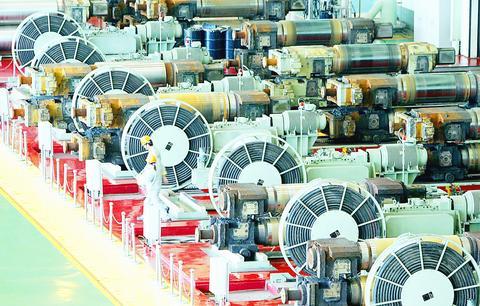China's government will step up its lending curbs and investment restrictions because industrial expansion by state companies has yet to be reined in sufficiently, Vice Premier Zeng Peiyan (曾培炎) said.
"We must increase structural adjustments," Zeng said in a speech to the World Economic Forum's China Business Summit in Beijing. "Macroeconomic adjustments have been effective, but these are just initial results. We can't relax the campaign."

PHOTO: EPA
China's industrial production growth picked up last month for the first time in six months, the government said Friday, suggesting lending curbs are having less of an impact. Inflation, which may be reported today, is forecast to have accelerated from a seven-year high, a Bloomberg survey showed.
"The government was too slow to implement measures to cool fixed-asset investment," Bruce Murray, chief representative of the Asian Development Bank in Beijing, said. "That's why the policies haven't been as effective as they might."
China has clamped down on lending to the steel, cement, real estate and other industries to cool an investment boom that it blames for causing power shortages, clogging transport links and driving up raw materials prices.
INVESTMENTS
China's investment in factories, roads and other fixed assets rose 32 percent from a year earlier last month, Wu Jinglian (
Zeng said the government will extend the loan crackdown to make it more difficult for state companies to expand. Authorities will continue to monitor investment in industries such as steel, autos and property, he said.
The central government plans to pare the number of business licenses and approvals required in an attempt to make the economy more market-oriented and reduce the influence of the state, Minister of the National Development and Reform Commission Ma Kai (馬凱) said at the forum.
Ma, who has berated local governments this year for fuelling "blind" and "haphazard" investments, said this year's slowdown in fixed-asset investment showed the government was right to use administrative measures to slow the economy.
"History will prove that this regulation avoided big ups and downs in the Chinese economy," Ma said. "We have to constantly enrich the content of macro regulation."
Interest rates
Economists including Qu Hongbin (
China should hold off from raising rates as higher borrowing costs may deter private investment, which is needed to drive economic growth and create jobs, said Cheng Siwei (程思危), vice chairman of the National People's Congress.
"We want to improve the effectiveness and efficiency of our investments," he said at the forum. "China doesn't want to slow economic growth."
Central bank Governor Zhou Xiaochuan (周小川) said last week that policy makers will decide whether to raise interest rates after reviewing last month's economic reports. China's inflation rate matches the People's Bank of China's one-year lending rate, which has been held at 5.31 percent since February 2002 and was last raised in 1995.
The central bank on Friday rejected media reports that it's told commercial lenders to prepare for a rate increase next month.

In Italy’s storied gold-making hubs, jewelers are reworking their designs to trim gold content as they race to blunt the effect of record prices and appeal to shoppers watching their budgets. Gold prices hit a record high on Thursday, surging near US$5,600 an ounce, more than double a year ago as geopolitical concerns and jitters over trade pushed investors toward the safe-haven asset. The rally is putting undue pressure on small artisans as they face mounting demands from customers, including international brands, to produce cheaper items, from signature pieces to wedding rings, according to interviews with four independent jewelers in Italy’s main

Japanese Prime Minister Sanae Takaichi has talked up the benefits of a weaker yen in a campaign speech, adopting a tone at odds with her finance ministry, which has refused to rule out any options to counter excessive foreign exchange volatility. Takaichi later softened her stance, saying she did not have a preference for the yen’s direction. “People say the weak yen is bad right now, but for export industries, it’s a major opportunity,” Takaichi said on Saturday at a rally for Liberal Democratic Party candidate Daishiro Yamagiwa in Kanagawa Prefecture ahead of a snap election on Sunday. “Whether it’s selling food or

CONCERNS: Tech companies investing in AI businesses that purchase their products have raised questions among investors that they are artificially propping up demand Nvidia Corp chief executive officer Jensen Huang (黃仁勳) on Saturday said that the company would be participating in OpenAI’s latest funding round, describing it as potentially “the largest investment we’ve ever made.” “We will invest a great deal of money,” Huang told reporters while visiting Taipei. “I believe in OpenAI. The work that they do is incredible. They’re one of the most consequential companies of our time.” Huang did not say exactly how much Nvidia might contribute, but described the investment as “huge.” “Let Sam announce how much he’s going to raise — it’s for him to decide,” Huang said, referring to OpenAI

The global server market is expected to grow 12.8 percent annually this year, with artificial intelligence (AI) servers projected to account for 16.5 percent, driven by continued investment in AI infrastructure by major cloud service providers (CSPs), market researcher TrendForce Corp (集邦科技) said yesterday. Global AI server shipments this year are expected to increase 28 percent year-on-year to more than 2.7 million units, driven by sustained demand from CSPs and government sovereign cloud projects, TrendForce analyst Frank Kung (龔明德) told the Taipei Times. Demand for GPU-based AI servers, including Nvidia Corp’s GB and Vera Rubin rack systems, is expected to remain high,